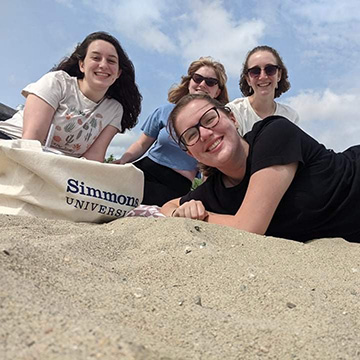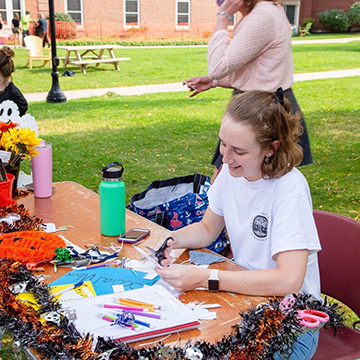What were you looking for during your college search process?
I always knew I wanted to be in the city for college, preferably at a smaller school where I would be able to do some hands-on learning. After being encouraged by a friend to look at Simmons, I took a tour and fell in love with the tight-knit community you could feel on campus. I loved that there were so many different fields of study to choose from and additional opportunities to study outside of your major. As I enter my fourth year at Simmons, I can say that all of these factors help make Simmons home.
What inspired you to declare majors in economics and sociology?
My journey to economics and sociology was an interesting one. I came to Simmons as a journalism major and very quickly realized that track wasn’t for me. I changed my major to marketing and still wasn’t satisfied. I took a sociology course on a whim and enjoyed applying sociological theory to the real world. I love learning about the social systems (and the problems within them) that shape our daily lives.
I hate math, so economics was never really a course of study I had considered. It was in one of my sociology classes that I realized I would never understand the full scope of societal issues without understanding how the economy worked. I took an economics course and discovered that not only was it not math, but it provided a more practical approach to some of the issues addressed in sociology. The interdisciplinary nature of these two majors has broadened my perspectives and understandings of the modern world.
The interdisciplinary nature of these two majors has broadened my perspectives and understandings of the modern world.
Tell us about the PLAN courses you've taken.

The first PLAN (Purpose Leadership ActioN) course I took was my honors learning community titled “Race, Class, and Meritocracy in American Education.” It brought together the disciplines of economics and education, looking at how economic and racial inequality lead to widespread disparities in schools across the United States and how the standardized testing and choice school movements exacerbate this existing inequality. We also did service-learning at a school in Jamaica Plain, working with K-5 students across different disciplines.
My leadership course was called “Resisting Authority,” which was about understanding the meaning of authority and the construction of hierarchies in society. We explored instances where authority failed and what it looked like to challenge authority in this context.
Did you find your PLAN courses impactful?
The way I look at it, my learning community changed my life. I learned about an issue that divided my hometown and shaped my educational experiences growing up. I now see where the public school system in my community failed low-income students and students of color, and I plan on using this knowledge to work in educational reform in the future. Questions about social, racial, and economic inequality in education pointed me toward my social science double major.
My leadership course challenged me to reflect on my leadership style. As an introvert, it can be difficult to question authority. This class made me consider the value of my voice and how leadership can exist in many different forms.
Have you applied lessons from these courses elsewhere?
My interest in educational equity that sparked in the learning community has stayed with me throughout my college career. In my sociology and economics courses, I have continued to explore how capitalism has shaped the American education system and its purpose in society.
What I learned in my learning community inspired my senior thesis in economics, which examines low-income student access to higher education following the Great Recession. I’m also lucky enough to have Professor Aoki, one of my learning community professors, serve as my thesis advisor.
Tell us about your experience as SGA President.

Never in a million years did I think I would be a part of student government, let alone serve as president. I ran for election at the end of my first year because I thought it would be a great way to immerse myself in the Simmons community and create change on campus.
I love having the opportunity to work alongside my peers on issues we are passionate about, whether it be about food insecurity on campus or ensuring that all student voices are heard. One of the newer branches of SGA, the Student Senate, is a think tank for student initiatives on campus and one of my favorite aspects of SGA. Our four committees — dining, financial, academic, and student life — target four different facets of life as a college student. I’m proud of the work I’ve seen senators accomplish in the past two years and look forward to what is to come!
I am regularly encouraged to use my passions to change the world, something I plan on carrying with me for the rest of my life.
What have you learned from this experience?
SGA has been one of the most fulfilling experiences I’ve had at Simmons. Simmons students are incredibly passionate about making the college experience equitable and accessible, and I have learned so much about what it means to be an inclusive leader. Switching to a fully online platform over the past year wasn’t easy, but there was so much to learn about leadership and student involvement across different modalities. In many ways, we saw how an online platform makes student government accessible to students who would not be able to participate otherwise.
I am also interested in higher education as a career, so I have gained valuable experience applying my interests in higher education and educational equity to my work on student government.
How is Simmons preparing you to become an everyday leader?
The leadership opportunities at Simmons provide students with the tools to approach problem-solving through a lens of equity and inclusivity. Professors at Simmons set expectations high but give students the support they need to exceed them. As a leader, this has given me the confidence to ask “what’s next?” instead of being complacent with our current systems, whether they be inside or outside of the classroom. I am regularly encouraged to use my passions to change the world, something I plan on carrying with me for the rest of my life.

